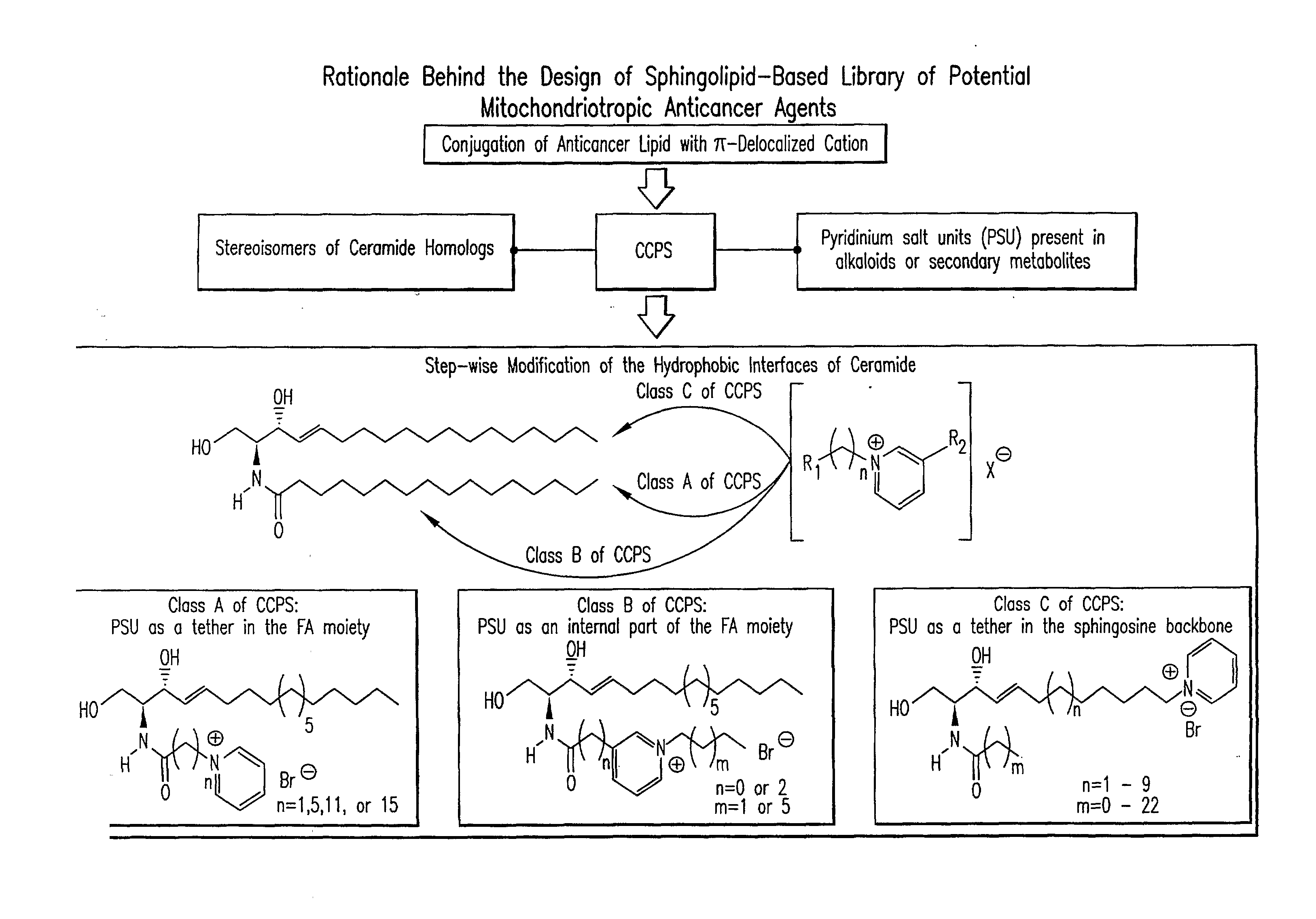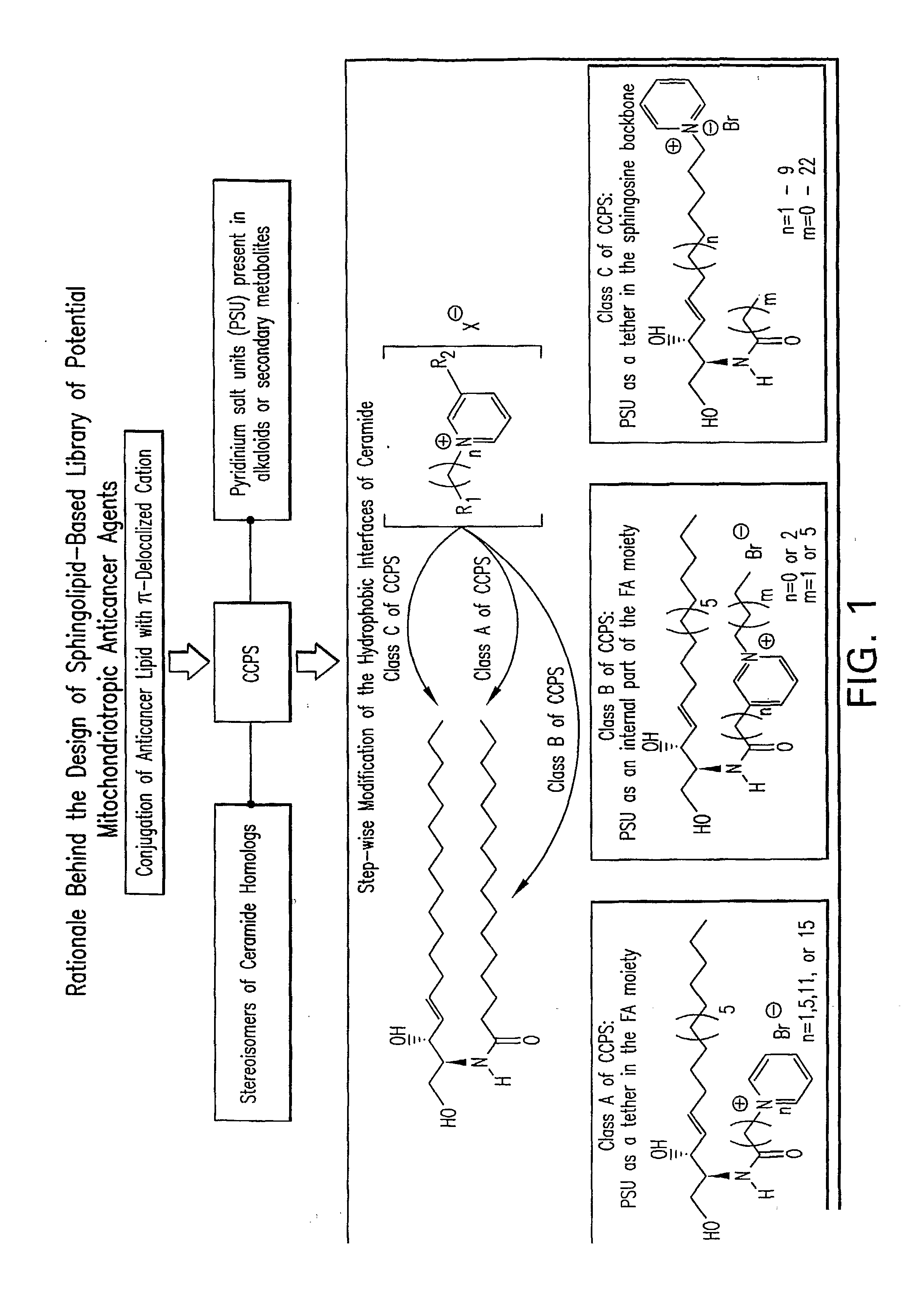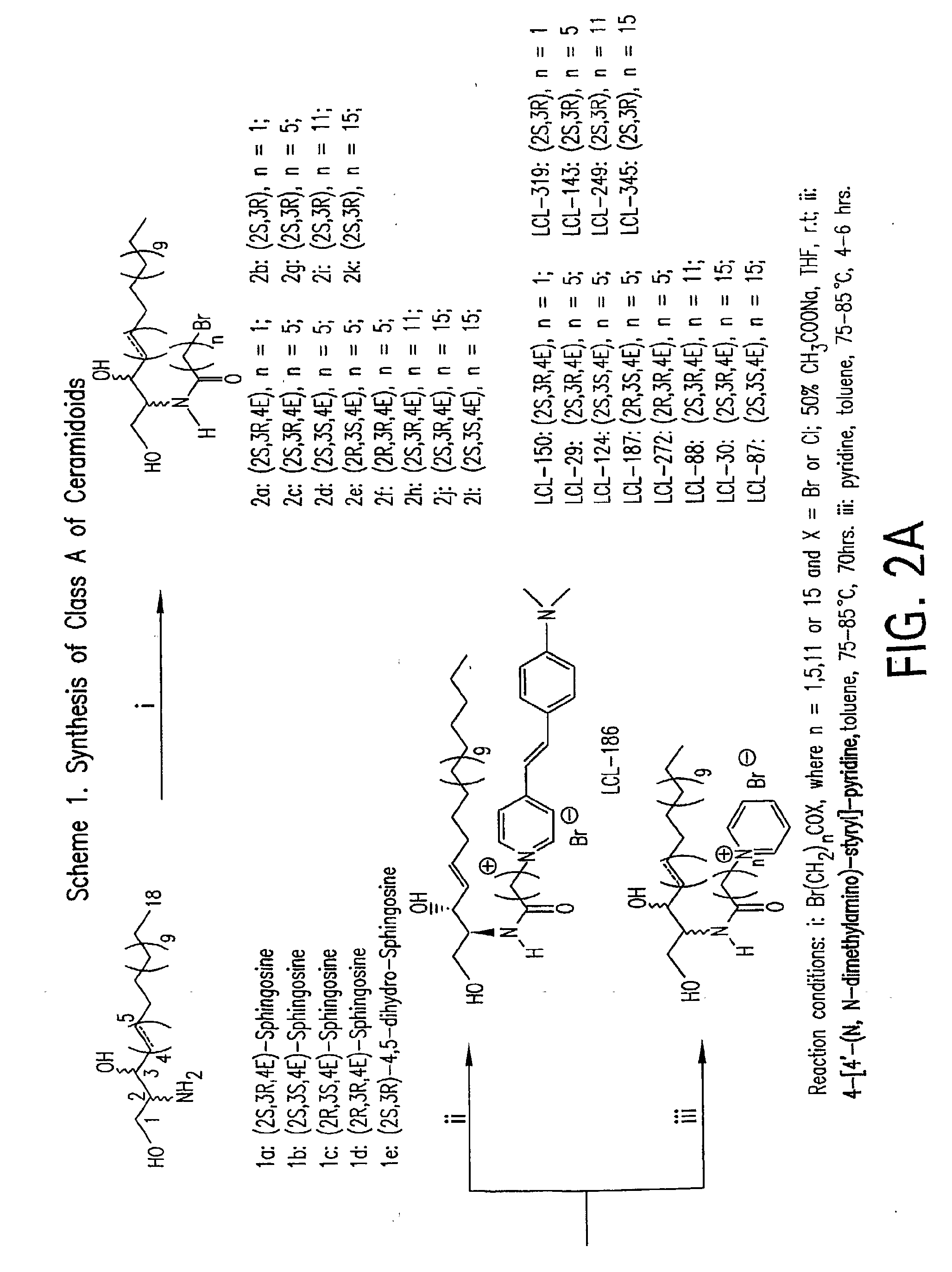Cationic Ceramides, And Analogs Thereof, And Their Use For Preventing Or Treating Cancer
a technology of ceramides and dihydro ceramides, applied in the field of cationic ceramides, dihydro ceramides, their analogs and their derivatives, can solve the problems of hampered studies on the direct effect of ceramides on mitochondria, and achieve the effects of improving solubility, reducing cell proliferation and/or viability, and cellular uptak
- Summary
- Abstract
- Description
- Claims
- Application Information
AI Technical Summary
Benefits of technology
Problems solved by technology
Method used
Image
Examples
example 1
6.1. Example 1
[0568]D-erythro-2-N-(2′-Bromoacetyl)-sphingosine (2a). To a well-stirred mixture of D-erythro-sphingosine (1a, 200 mg, 0.67 mmol), 50% aqueous solution of sodium acetate (5 mL) and THF (12 mL) bromoacetyl bromide (98%, 0.180 mL, 2 mmol) was added drop-wise at room temperature. The reaction mixture was stirred for 20 min until a complete conversion of 1a to 2a was achieved (TLC monitoring). After the reaction was completed, the organic phase was separated and the aqueous layer was extracted with ethyl acetate (2×10 mL). The organic phases were combined, dried over anhydrous magnesium sulfate and evaporated under reduced pressure to dryness to give crude product. This material was purified by flash column chromatography (elution with CHCl3-MeOH-conc. NH4OH, 5:1:0.05, v / v / v) following recrystallization from ethyl acetate, to give 204 mg (73%) of pure 2a as white microcrystalline powder, mp 79-81° C.; TLC: Rf (CHCl3-MeOH, 5:1, v / v) Rf 0.52; [α]22D=+6.0° (c=1, CHCl3); [α]22...
example 2
6.2. Example 2
[0570]D-erythro-2-N-(2′-Bromoacetyl)-4,5-dihydro-sphingosine (2b). To a well-stirred mixture of D-erythro-4,5-dihydro-sphingosine (1e, 250 mg, 0.83 mmol), 50% aqueous solution of sodium acetate (5 mL) and THF (12 mL) bromoacetyl bromide (98%, 0.223 mL, 2.5 mmol) was added drop-wise at room temperature. The reaction mixture was stirred for 25 min until a complete conversion of 1 e to 2b was achieved (TLC). After the reaction was completed, the organic phase was separated and the aqueous layer was extracted with ethyl acetate (2×10 ml). The combined organic layers were dried over anhydrous magnesium sulfate and evaporated under reduced pressure to dryness to give crude product. The crude Cer was purified by flash column chromatography (elution with CHCl3-MeOH-conc. NH4OH, 5:1:0.05, v / v / v) following recrystallization from n-hexane-acetone (3:1, v / v) to give 230 mg (65%) of pure 2b as white microcrystalline powder, mp 129-131° C.; TLC (CHCl3-MeOH, 5:1, v / v) Rf 0.54; [α]25D...
example 3
6.3. Example 3
[0572]D-erythro-2-N-(6′-Bromohexanoyl)-sphingosine (2c). To a well-stirred mixture of D-erythro-sphingosine (1a, 335 mg, 1.12 mmol), 50% aqueous solution of sodium acetate (10 mL) and THF (24 mL) 6-bromohexanoyl chloride (97%, 0.269 mL, 1.7 mmol) was added drop-wise at room temperature. The reaction mixture was stirred for 20 min until a complete conversion was achieved (TLC). After the reaction was completed, the organic phase was separated and the aqueous layer was extracted with ethyl acetate (2×15 mL). The organic phases were combined, dried over anhydrous magnesium sulfate and evaporated under reduced pressure to dryness to give crude product. This material was purified by flash column chromatography (elution with CHCl3-MeOH-conc. NH4OH, 5:1:0.05, v / v / v) following recrystallization from n-hexane-ethyl acetate (4:1, v / v) to give 446 mg (79%) of pure 2c as white microcrystalline powder, mp 48-50° C.; TLC (CHCl3-MeOH, 5:1, v / v) Rf 0.60; [α]22D=−2.95° (c=1, CHCl3) and...
PUM
| Property | Measurement | Unit |
|---|---|---|
| Electrical conductance | aaaaa | aaaaa |
| Electrical conductance | aaaaa | aaaaa |
| Molar density | aaaaa | aaaaa |
Abstract
Description
Claims
Application Information
 Login to View More
Login to View More - R&D
- Intellectual Property
- Life Sciences
- Materials
- Tech Scout
- Unparalleled Data Quality
- Higher Quality Content
- 60% Fewer Hallucinations
Browse by: Latest US Patents, China's latest patents, Technical Efficacy Thesaurus, Application Domain, Technology Topic, Popular Technical Reports.
© 2025 PatSnap. All rights reserved.Legal|Privacy policy|Modern Slavery Act Transparency Statement|Sitemap|About US| Contact US: help@patsnap.com



